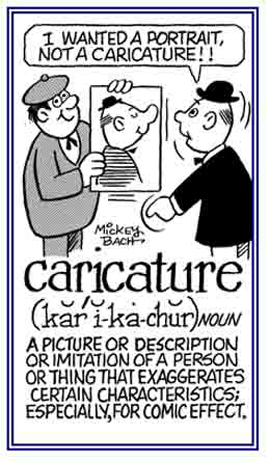2. Any imitation or copy so distorted or inferior as to be ludicrous: Mary bought a book for her art class with lots of caricatures showing people and animals that are quite grotesque, exaggerated, and peculiar.
3. Etymology: from French caricature, from Italian caricatura "satirical picture"; literally, "an overloading", from caricare "to load, exaggerate" from Vulgar Latin carricare; from Latin carrus, "car".
Accordingly, caricature properly means "an excess in drawing or painting".
The history of the word caricature goes back through the centuries to a time when the Romans occupied Gaul, offering the blessings of civilization to the Gauls but also borrowing from them as well.
One such borrowing, the Gaulish word karros, “a wagon or cart”, became Latin carrus, “a Gallic type of wagon". This Latin word continued to roll through the English language, giving us car, career, cargo, carry, and charge, among others.
Caricature, is another offspring of carrus, which came to us via French from Italian, in which caricatura, the source of the French word, was derived from Italian caricare, “to load, to burden", or "to exaggerate".
Caricare in turn came from Late Latin carricre, “to load”, derived from the Romans' Gaulish borrowing of carrus.

